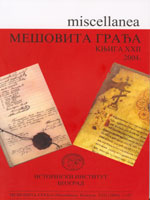Извештај Сретена Л. Поповића из 1886. године о Ратарској школи у Краљеву
Report of Sreten L. Popović from 1886 about the Agricultural School in Kraljevo
Author(s): Gordana Garić PetrovićSubject(s): History, 19th Century
Published by: Istorijski institut, Beograd
Keywords: Agricultural School; report; Kraljevo; Ministry for National Economy; agriculture; agricultural schools
Summary/Abstract: The Agricultural School in Kraljevo was established in 1882 based on the Law on Lower Schools for Rural Economy. The Serbian Agricultural Society and former professors of the Agricultural School in Topčider and the Agricultural Forestry School in Požarevac played an important role in its establishment. Đorđe Radić, who was the school principal in three instances (1882–1889, 1892–1893, 1895–1897), doubtless gave the main contribution to its establishment and operation in the first decades of its existence. During the first years of its work, this educational institution faced great temptations. The mistrust towards the work methods in the school and agricultural education in general was present in the public for a long time. Dilemmas concerning the objectives of such type of education resulted in different forms of public criticism, including rumours. Prompted by frequent rumours about the bad state of the school and the students’ lack of knowledge, Minister of Finance Čedomilj Mijatović, who was also Acting Minister for National Economy, delegated Sreten L. Popović, president of the Serbian Agricultural Society, to make an inspection of the school and submit a report. The departure of Sreten L. Popović to Kraljevo in summer 1886 primarily concerned the case of the first factory of agricultural appliances, opened by Aksentije Bogdanović and Srećko Vasić. After he finished his work relating to the factory, Sreten Popović visited the Agricultural School. He visited the premises where silkworm was cultivated, as well as the stables and the small experimental field, consisting of several beds sown with hulled wheat and forage crops. He also familiarised himself with the number and quality of the school’s agricultural machinery and tools, while the students showed him how they handled these machines in practice. During the inspection, students’ knowledge was checked also in regard to fruit growing and grafting, farming, cultivation of some industrial plants, various types of soil and the purpose of some agricultural appliances. Sreten L. Popović was so satisfied with the demonstrated knowledge that he recommended to the Minister the organisation of public exams at the Agricultural School, as a type of agricultural courses. The main remarks concerned the lack of soil for experimental fields and pasture, the lack of a school orchard, and the method of cultivation of silkworms. A great number of these remarks were adopted and over the following two decades the school experienced great progress as it increased its movable and immovable property and introduced new and modern methods of production and processing.
Journal: Мешовита грађа
- Issue Year: 2016
- Issue No: 37
- Page Range: 85-121
- Page Count: 37
- Language: Serbian

